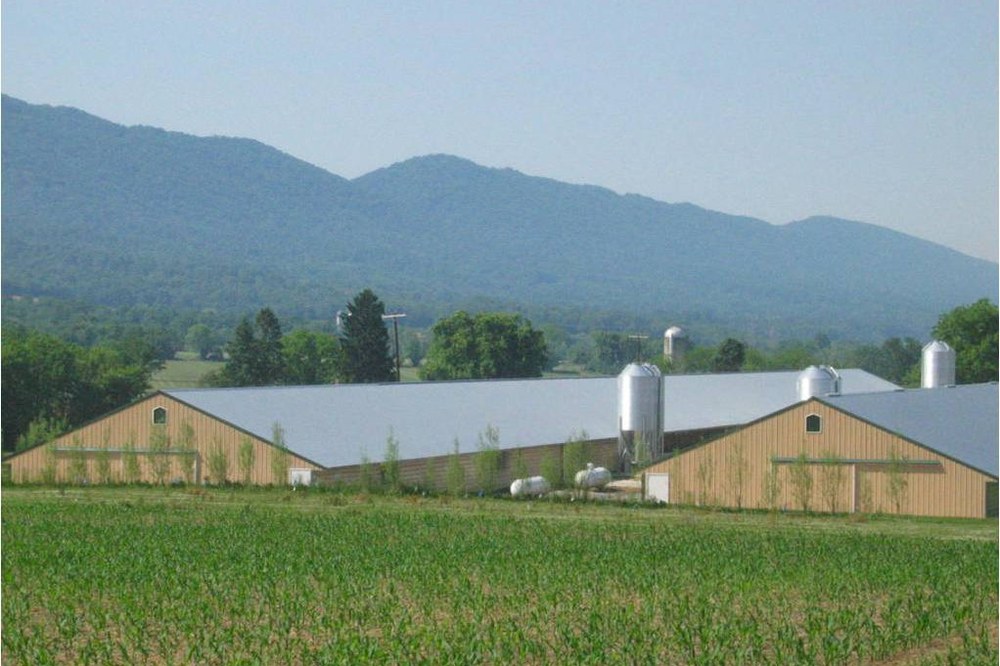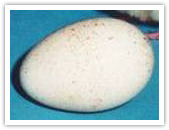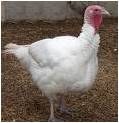The modern turkey industry has developed a hybrid white turkey that is larger and faster growing than purebred or wild turkeys. The modern hybrid turkeys are so large they can no longer naturally breed efficiently. All modern turkeys are artificial insemination. Artificial insemination allows selective breeding of the sexes so breeders can raise fewer males and achieve higher rates of hatchability.

Parent Stock Breeders
Once the poults arrive at the integrated company's breeder grow-out farm, the birds are raised to 28 weeks of age under environmentally controlled conditions. Controlling the length of daylight is extremely important. Breeder turkeys are never allowed more than 10 hours of light daily as they are growing so they are not prematurely stimulated to lay eggs. During the 28 weeks of grow-out, hens will grow to 24-30 lbs and eat about 102 pounds of feed. Males will grow to 50-70 pounds and eat over 200 pounds of feed. Once they reach 28 weeks of age, parent breeding stock are transported to the breeder farm.
The parent breeders produce fertile eggs that will become turkeys harvested for meat. Female breeders are raised in open floor houses with automatic watering, feeding and egg collection systems. Males are raised in floor pens at separate facilities. Since natural mating puts the female at risk of injury commercial meat turkeys are all bred artificially. This is unique in the poultry industry. Toms are raised separate from the hens, semen is collected from the toms, and hens are artificially inseminated once every seven days depending on fertility rates. Females begin producing eggs around 28 weeks of age and will lay efficiently for 26 weeks. An average turkey breeder female will lay 100-130 eggs per laying cycle.

Hatching eggs
Once the turkey breeder female reaches 28 weeks of age they will start laying. It takes a female between 24 and 32 hours to produce a fertile egg. The eggs are automatically collected daily, transported to the hatchery, and stored at 55-65° F and 70% humidity until they are set in the incubator. The eggs are held here for about three to 10 days prior to being placed in an incubator. One fertile hatching egg is worth $.88 each and weighs around 86g.
Incubation
Most integrated companies own their own hatchery to produce the poults. Incubators will hold thousands of eggs in a very controlled environment. They are then transferred into hatching baskets, and on the 28th day the poults hatch.
Hatching
After hatching, poults they are removed from the hatchers and processed before being taken to a grow-out farm. Processing of turkeys include sexing (separating the males and females so the company can raise the two sexes separately), beak and toe trimming and vaccination. Poults are counted and placed in baskets for delivery to the farm within 12 hours of hatch. A commercial turkey poult is worth about $1.30 and weighs about 60g.


Grow-out
At the grow-out farm, poults are then placed in a floor rearing houses where they are raised under environmentally controlled conditions. Ventilation of the turkey house is critical for controlling temperature and humidity in the grow-out house. Birds are grown to different sizes depending on the market that they are meant to fill. On average, a hen turkey will consume around 35 pounds of feed (current cost of about $5.69 or $.33/pound of gain) and reach 14-20 pounds (live weight) in 12-14 weeks. Toms will consume about 90 pounds of feed (current cost of about $14.65 or $.38/pound of gain) and reach 35-42 pounds in 16-19 weeks.
Once the birds reach the desired weight a company catching crew will catch and load the birds onto trucks for transportation to the processing plant. The catching crew takes a great deal of care in handling the birds to prevent bruises or injury.
Harvesting
At the processing plant turkeys are humanely slaughtered as quickly as possible. Once they are slaughtered, the feathers, offal, head, legs, and other items are removed leaving a whole dressed carcass ready for sale or to send onto further processing. The cost of processing turkey is about $.19 per pound. The wholesale price for a whole turkey carcass is about $.65 per pound.

Further Processed Products

This is where we make the product more convenient as well as add value to the product. In the meat industry further processing means something is done to the whole carcass such as cut-up, deboning, and fabricating poultry meat into value-added products. The cut-up operation is often done at the processing plant. However, some companies ship the whole carcasses to the further processing plant for specialized cut-up. Cut-up is where machines cut the whole carcass into individual parts. Deboning is where the bones are removed to make specific items like breast filets or other boneless products.
Value-added refers to fabricating the carcass into consumer-ready products that requires additional time or labor. These products usually involve seasoning, breading, sauces, and marinating, as well as special packaging to meet market demands for convenient products. The added value results in higher margins and profits while providing a large product choice for the consumer.

